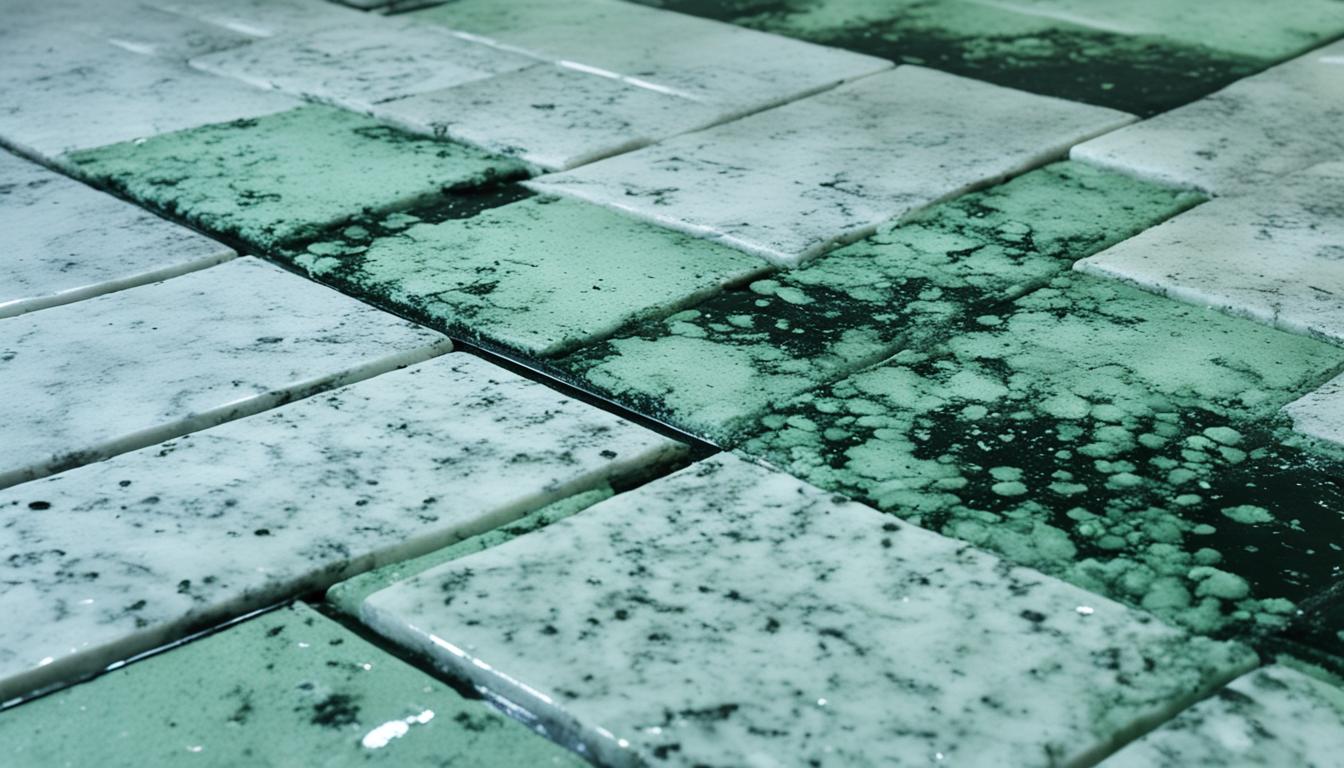
Mold on Marble Tile Floors Miami FL – Remediation Tips
Marble tile floors exude elegance and sophistication, making them a popular choice among homeowners in Miami, FL. However, these stunning surfaces are not immune to the threat of mold growth. If left unchecked, mold can cause significant damage to your marble tiles and compromise the aesthetic appeal of your home. In this section, we will provide expert tips for effectively tackling mold on marble tile floors in Miami, FL. With our mold remediation tips, you can ensure that your elegant surfaces remain pristine.
Key Takeaways:
- Mold on marble tile floors in Miami, FL can compromise the beauty of your surfaces.
- Effective mold remediation tips can help you tackle mold growth on marble tiles.
- Regular maintenance and diligent cleaning are crucial to preventing mold on marble floors.
- Seeking professional help for mold removal is recommended for extensive mold infestations.
- Ensuring good ventilation and controlling humidity levels can help prevent mold growth on marble tiles.
Professional Mold Removal in Miami – Preventing and Removing Mold from Marble Tiles
Mold growth on marble floors can be a common issue, particularly in humid environments like Miami, FL. To maintain the pristine condition of your marble tiles, it is essential to take preventive measures and promptly address any mold issues that arise. In this section, we will explore effective techniques to prevent mold from infiltrating your marble floors and provide step-by-step instructions for removing mold from marble tiles.
Preventing Mold on Marble Floors
Preventing mold growth on marble floors starts with maintaining the right conditions and implementing regular cleaning practices:
- Control humidity: Keep humidity levels in your home or office below 50% to create an environment where mold is less likely to thrive.
- Proper ventilation: Ensure adequate ventilation in bathrooms, kitchens, and other areas prone to moisture accumulation. Use exhaust fans or open windows to promote airflow and reduce moisture buildup.
- Quickly address spills and leaks: Wipe up any spills or leaks immediately to prevent standing water or excess moisture from seeping into the marble tiles.
- Regular cleaning: Clean your marble floors regularly with a pH-neutral cleaner designed specifically for marble. Avoid acidic or abrasive cleaners that can damage the surface.
Removing Mold from Marble Tiles
If you discover mold on your marble tiles, it’s crucial to take immediate action to prevent its spread and minimize damage:
- Protective gear: Before starting the removal process, ensure you are wearing protective gloves, goggles, and a face mask to avoid exposure to mold spores.
- Prepare a cleaning solution: Mix a solution of water and mild detergent or a commercial mold cleaner. Test the solution in a small, inconspicuous area to ensure it does not damage the marble surface.
- Apply the solution: Dip a soft sponge or cloth into the cleaning solution and gently scrub the affected areas. Avoid using abrasive materials that can scratch the marble.
- Rinse and dry: After removing the mold, rinse the marble tiles with clean water and dry thoroughly with a clean towel to prevent any leftover moisture that may promote future mold growth.
- Monitor and prevent: Regularly inspect your marble floors for signs of mold growth and address any moisture issues promptly to prevent further mold development.
Professional Mold Removal Services in Miami
If the mold infestation is extensive or if you prefer to leave the remediation process to experts, there are professional mold removal services available in Miami. Skilled professionals can assess the extent of the mold problem, provide thorough remediation, and implement preventive measures to avoid future mold growth. Hiring professionals can save you time, effort, and ensure a thorough and effective mold removal process.
By taking preventive measures and following the proper techniques for removing mold from marble tiles, you can maintain the beauty and integrity of your marble floors in Miami. However, for extensive mold issues or added peace of mind, it’s always best to consult with professional mold removal specialists in your area.
Marble Tile Maintenance Tips and Miami Marble Floor Cleaning Specialists
Proper maintenance is essential for preserving the beauty of your marble tile floors and preventing mold growth. Here are some valuable tips to help you maintain your marble tiles:
1. Regular Cleaning: Use a soft microfiber mop or cloth to remove dirt and debris from the surface of the marble. Avoid using abrasive cleaners or scrub brushes, as they can damage the marble.
2. Mild Cleaning Solutions: For routine cleaning, use a pH-neutral cleaner specifically formulated for marble. Avoid acidic or harsh chemical cleaners, as they can etch the surface of the marble and make it more susceptible to mold growth.
3. Proper Sealing: Apply a high-quality marble sealer to protect your marble tiles from moisture and stains. This will help prevent mold from infiltrating the porous surface of the marble.
To ensure the longevity of your marble floors and maintain a mold-free environment, it’s advisable to seek expertise from Miami’s marble floor cleaning specialists. These professionals have the knowledge and tools to perform thorough cleanings, remove deep-seated stains, and restore the shine of your marble tiles.
Furthermore, regular mold inspections for marble floors are crucial in detecting and preventing mold issues. Mold inspection specialists in Miami can assess the condition of your marble floors, identify potential sources of moisture or mold growth, and provide tailored solutions to keep your floors mold-free.
By following these marble tile maintenance tips and partnering with Miami’s marble floor cleaning specialists and mold inspection experts, you can ensure the long-lasting beauty and cleanliness of your marble tile floors.




